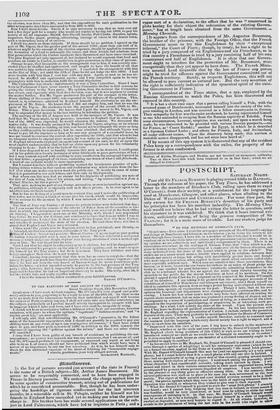glietrIirmetfuti.
In the list of persons arrested (on account of the riots in France) is the name of a British subject—Mr. Arthur James Beaumont. He seems to be respectably connected, and to have been engaged in France in literary pursuits. We understand the charge against him to be some species of constructive treason, arising out of publications for which he is considered accountable. But, though he has been under- going the hardships of rigorous confinement for the last nineteen months, in a miserable cell in St. Pelagic, neither he himself nor his friends in England have succeeded yet in making out what the precise charge is. his brother here has made several applications on the sub- ject to Lord Palmerston, %% Lich ha % c led to inquiries in Paris ; and a vague sort of a declaration, to the effect that be was "concerned in plots having for their object the subversion of the existing Govern. ment," has at length been obtained from the same Government...- Morning Chronicle.
[It appears from the correspondence of Mr. Augustus Beaumont, the brother of the prisoner, with the Foreign Office, that the French Government mean to try this Englishman by their "exceptional tribunal," the Court of Peers ; though, by treaty, be has a right to be tried by a jury composed of six Englishmen and six Frenchmen, as in this country a Frenchman is tried by a jury consisting half of his own countrymen and half of Englishmen. It is clear that our Govern- ment might to interfere for the protection of Mr. Beaumont, more energetically than they yet appear to have done. The French Minis- ters assured Lord Granville that by the law of France any person might be tried for offences against the Government committed out of the French territory. Surely, as respects Englishmen, this will not be allowed to pass current as national law. But the very assertion of the right is sufficiently indicative of the tyrannical spirit of the exist- ing Government in France.)
A correspondent of the Times states, that a spy, employed by the Russian Government to watch the Poles, has been discovered and exposed in this country. " It is but a short time since that a person calling himself a Pole, with the assumed name of Dombrowski, insinuated himself Into the society of the refu- gees residing in London, and was received as a fellow eountryinan in distress. Their sympathy for him was the easier awakened, he having represented himself as one who succeeded in escaping from the Russian captivity at Tobolsk. From some circumstances, however, suspicion was excited ; and npon a search being made, he was discovered to 13e provided with various Russian passports,—one for Fiance, as Count Rutiski; another for Egypt, in which he is described as a German Colonel Luder ; and others for Prussia, Italy, and Switzerland, all under different names. Upon the discovery being made, this corium et mutabile nomen disappeared, and has not since been heard of."
If by means of this spy system it is discovered that any of the resident Poles keep up a correspondence with the exiles, the property of the former is at once confiscated.


























 Previous page
Previous page